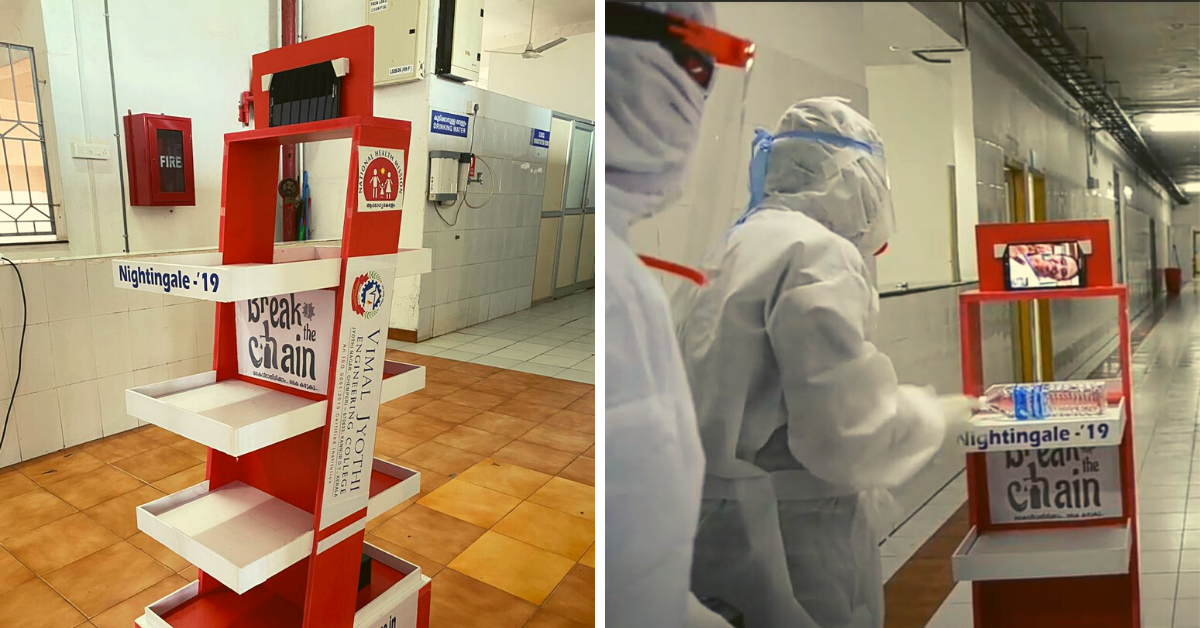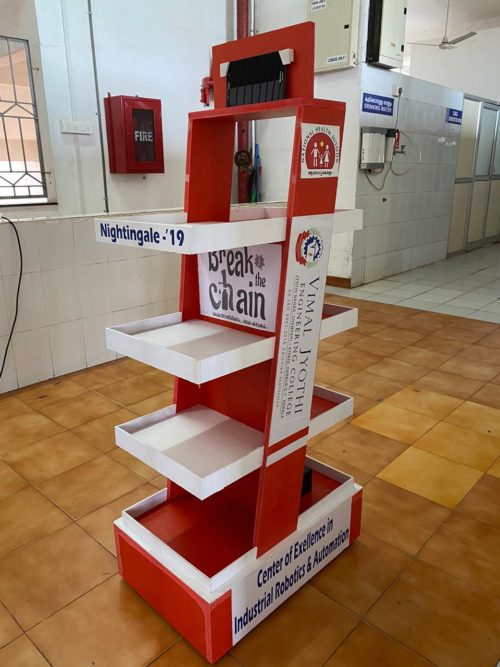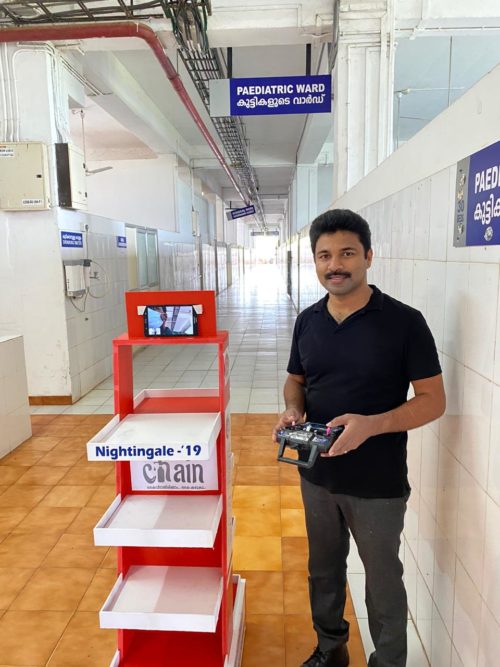Kerala’s ‘Nightingale-19’ Robot Serves Meals, Helps Doctors Treat COVID-19 Patients
“The doctors, nurses and canteen staff have to regularly visit the patients’ room to provide their meals, water, refreshments and even for check-up rounds. They would have to wear a PPE kit and dispose it off immediately. That’s when we thought, why not create a cost-efficient robot that can help with these routine visits?"

For the past one week, the hallways of the Kannur Medical College Hospital have been empty. Although there are approximately 50 patients who have been admitted after exhibiting symptoms of COVID-19, the doctors and nurses don’t have to run around the hospital in their PPE kits thanks to a new caretaker that has recently taken charge.
Developed by the professors and students of the Vimal Jyothi College Of Engineering, the ‘Nightingale-19 robot’ has been providing the patients in the hospital with meals, water and even a chance to communicate face to face, virtually with the doctors who are treating them.
Join The Better India’s “BETTER TOGETHER” initiative to help migrant labourers, daily wage earners, frontline workers, and all those who need our support in this fight against COVID-19.
Unable to view the above button? Click here
With a capacity to hold items up to 25 kg, it can serve meals and 1-litre bottles to 15 patients at a time and allows the patients to make calls to their doctor and even their relatives.
The robot was inaugurated via video call last week and has functioning been since then.
How A Ventilator Turned Into A Robot

Prof Sunil Paul, one of the many brains behind the Nightingale-19 was initially looking to create an innovative ventilator—one that would be an improvement upon the current design—but before proceeding, they visited the Kannur Medical College Hospital and asked the medical staff for what kind of help they were looking for.
The overwhelming response was that they were looking to reduce the frequent visits to the patient’s room.
“The doctors, nurses and canteen staff have to regularly visit the patients’ room to provide their meals, water, refreshments and even for check-up rounds. Every time they went, they would have to wear a PPE kit and dispose of it immediately. That’s when we thought, why not create a cost-efficient robot that can help with these routine visits?” explains Sunil.
The team headed by Prof TD John, the Dean of the Robotics Department, developed the first prototype of the Nightingale-19 in the beginning of April. This prototype was a miniature form of the actual model and could carry three bottles.
Based on the feedback they received, the team decided to make the robot more user friendly for the medical workers and use MDF (Medium Density Fibre Board) instead of metal so that the robot can be disinfected without causing corrosion.
The team included a video calling unit in the robot so that the patients can converse with the doctors remotely.

“When the doctor comes for rounds, they are completely covered up in the PPE kit, and the patient will not be able to see their face when they speak. The robot’s camera facility will be able to break that barrier, but more importantly, it’ll reduce the risk of the spread,” explains Dr Ajtih Kumar, Nodal Officer, Kannur Medical College Hospital,
After two demo models, the team finalised on the third model which was christened as the ‘’Nightingale-19’.
Made with a microcontroller board, a car’s wiper motor, a car motor and a racing drone’s camera, the robot can be remote-controlled in a 1km range.
“Deriving knowledge from our previous experiences, we took the most sustainable and reliable equipment for this robot, and since we used material we were familiar with, it was easy to develop as well,” explains Sunil.
He insists that the project is entirely a team effort. “Our students Amal Babu, Daniel Paul and Noel Joseph, were also selected to work on the project along with the professors which made the process all the more exciting and fruitful,” he adds.
The cost of developing the robot was approximately Rs 45,000 which is very cost-efficient compared to the PPE kits, which cost Rs 1500 per kit and cannot be reused. “Also, they are not very comfortable to wear—especially in this heat. So, the robot has helped in that regard as well,” says Dr Ajithkumar.
Besides the robot, the team from Amal Jyoti College has also provided the hospital with foot pumped sanitizers.
Future Projects
When asked about developing the robot further on, Prof Sunil Paul explained that currently, the department has a few ongoing research projects with German universities, which may help in faster production of the robots.
“The need for these robots is only going to expand in the future. Based on its performance during the next two weeks, we will start supplying more robots to other hospitals shortly,” says Sunil, concluding the conversation.
Also Read: UP IAS Officer Creates Top-Quality PPE Kits At Half The Market Price!
(Edited by Gayatri Mishra)
Like this story? Or have something to share? Write to us: [email protected], or connect with us on Facebook and Twitter.
If you found our stories insightful, informative, or even just enjoyable, we invite you to consider making a voluntary payment to support the work we do at The Better India. Your contribution helps us continue producing quality content that educates, inspires, and drives positive change.
Choose one of the payment options below for your contribution-
By paying for the stories you value, you directly contribute to sustaining our efforts focused on making a difference in the world. Together, let’s ensure that impactful stories continue to be told and shared, enriching lives and communities alike.
Thank you for your support. Here are some frequently asked questions you might find helpful to know why you are contributing?


This story made me
- 97
- 121
- 89
- 167











